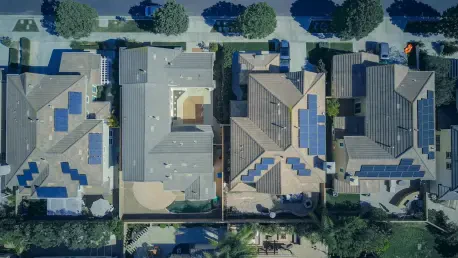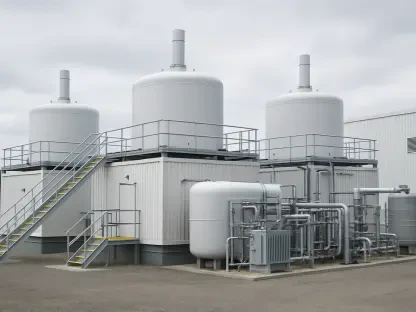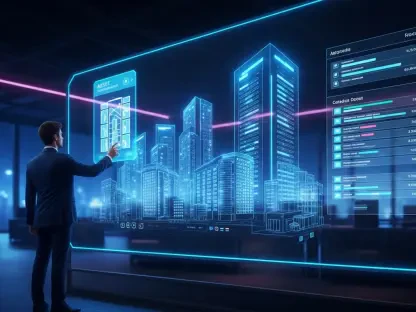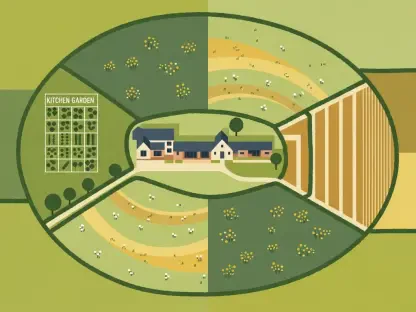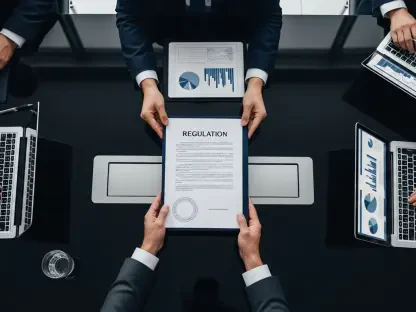In an era where climate change and resource depletion dominate global conversations, the housing industry faces mounting pressure to adapt and innovate, and one company has risen to the challenge with remarkable vision. KB Home, a prominent American homebuilder with over six decades of expertise and more than 650,000 homes constructed since its founding in 1957, has transformed from a conventional suburban developer into a champion of sustainable living. This shift isn’t merely a trend for the company; it’s a fundamental redefinition of what modern housing can and should be. By embedding eco-friendly practices and technologies into every home, KB Home ensures that green living is not a privilege reserved for the affluent but a standard accessible to a wide range of buyers. Their approach challenges long-standing industry norms, proving that sustainability and affordability can coexist without compromise. From energy-efficient designs to water-saving systems, their commitment touches every aspect of homebuilding, setting a powerful example for others to follow. As environmental concerns continue to shape consumer preferences and policy decisions, KB Home’s pioneering efforts offer a glimpse into a future where responsible construction is the norm, not the exception. This exploration delves into the strategies, innovations, and broader impacts that position this homebuilder as a leader in the sustainable housing revolution, highlighting how their work is reshaping communities and inspiring change on a global scale.
Revolutionizing Access to Eco-Friendly Homes
KB Home has fundamentally changed the landscape of sustainable housing by making green features a baseline in every home they build, rather than an expensive upgrade reserved for a select few. This commitment to accessibility ensures that buyers don’t have to choose between affordability and environmental responsibility. Standard inclusions like ENERGY STAR® certification guarantee energy efficiency, while solar-ready roofs provide a seamless path to renewable energy adoption. WaterSense® fixtures reduce consumption, and low-VOC materials improve indoor air quality, creating healthier living spaces. These elements are integrated into the Built to Order model, allowing customization without undermining eco-standards. By prioritizing such features across their portfolio, KB Home eliminates the financial barriers often associated with green living, ensuring that families from diverse economic backgrounds can benefit from reduced utility costs and a smaller environmental footprint. This democratization of sustainability sets a precedent in an industry where eco-options are frequently treated as premium add-ons, proving that responsible design can be both inclusive and practical for the modern homeowner.
Beyond the immediate benefits to buyers, this approach carries significant implications for market dynamics and consumer expectations. When eco-friendly features become the norm rather than the exception, it shifts the perception of what a home should offer in terms of efficiency and environmental impact. KB Home’s strategy has shown that sustainability can be a selling point without alienating budget-conscious buyers, as evidenced by the high demand for their homes in competitive markets. Their focus on accessibility also encourages other builders to rethink pricing models and design priorities, fostering a broader industry trend toward greener standards. Additionally, by embedding these features into every project, the company helps normalize sustainable choices, making them a default expectation rather than a novelty. This cultural shift is crucial for long-term environmental progress, as it aligns housing development with global goals for carbon reduction and resource conservation, ultimately benefiting both individual households and the planet at large.
Driving Progress with Cutting-Edge Technology
Innovation lies at the core of KB Home’s mission to redefine sustainable housing, with advanced technologies seamlessly integrated into their designs to maximize efficiency and minimize waste. One standout example is the SunPower® Equinox Solar System, installed during construction to ensure optimal performance and energy savings for homeowners. Equally impressive is their Water-Smart Landscaping, which, when paired with AI-powered WaterHero® controllers, can reduce water usage by up to 50% in regions prone to drought. Health Shield® Technology further enhances livability through advanced air filtration systems and low-toxin materials, prioritizing occupant wellness alongside environmental benefits. These advancements are not mere experiments but are scaled across their offerings, with over 90% of buyers choosing solar packages—a clear indicator of market acceptance and trust in these solutions. By leveraging such technologies, KB Home addresses critical challenges like energy costs and water scarcity, setting a high bar for what sustainable housing can achieve in practical, everyday terms.
The impact of these technological strides extends beyond individual homes, influencing broader trends in construction and consumer behavior. Partnerships with leading research institutions and tech firms enable KB Home to stay ahead of the curve, continuously refining their approach with data-driven insights. For instance, AI systems that adapt to homeowner habits help optimize energy use, while innovations in thermal wall systems cut heat loss significantly. These developments not only reduce environmental footprints but also deliver tangible financial savings, making green homes an attractive investment. As more buyers experience the benefits of such technologies, demand for similar features grows, pushing other builders to innovate or risk falling behind. This ripple effect amplifies the reach of KB Home’s efforts, contributing to a future where cutting-edge solutions are standard in housing, and sustainability becomes synonymous with smart, modern living.
Evolving Strategically Toward a Greener Vision
KB Home’s journey from a traditional mass-market builder to a sustainability frontrunner is a testament to strategic foresight and adaptability in a rapidly changing industry. Key initiatives have marked this transformation, beginning with the KB Home Green® program in 2000, which laid the groundwork for systematic eco-conscious building. A notable collaboration in 2008 with Martha Stewart helped popularize green design among mainstream audiences, while the 2020 Double Zero Initiative set ambitious goals for net-zero energy and water usage in their homes. These milestones reflect a deliberate shift toward aligning business practices with environmental imperatives. The market response has been telling—green-certified homes from KB Home resell 8.5% faster than conventional ones, demonstrating that sustainability resonates with buyers facing rising energy costs. This evolution showcases how ethical commitments can align with economic pragmatism, creating value for both the company and its customers in an increasingly eco-aware world.
This strategic pivot also highlights KB Home’s ability to anticipate and shape consumer needs while navigating industry challenges. By integrating sustainability into their core operations, they’ve positioned themselves as a trusted name in a competitive field, where differentiation is often difficult to achieve. Their focus on long-term goals, such as net-zero targets, signals a commitment to future-proofing housing against climate risks, which in turn builds confidence among stakeholders. Moreover, this approach has allowed them to tap into growing demand for efficient, cost-saving homes, particularly in regions with high utility expenses. The success of these strategies underscores a broader lesson for the sector: sustainability isn’t just a moral choice but a viable business model that can drive growth and customer loyalty. As KB Home continues to refine its vision, it sets a benchmark for others, proving that purposeful change can lead to lasting impact across communities and markets.
Fostering Trust with Transparent Practices
Transparency forms a cornerstone of KB Home’s relationship with its customers, ensuring that buyers are fully informed about the environmental and financial benefits of their homes. Tools like the Home Performance Guide and Sustainability Dashboard offer real-time insights into energy savings and ecological impact, empowering homeowners to understand and maximize the value of green features. This openness has cultivated a strong sense of trust, reflected in a 92% customer satisfaction rate from a 2023 J.D. Power Survey. Further evidence of loyalty comes from a remarkably low 1.2% contract cancellation rate and the fact that 45% of new buyers are referred by existing ones. By prioritizing clear communication and accessible data, KB Home not only enhances the buyer experience but also builds a reputation for reliability in an industry where trust can be hard to earn.
The emphasis on transparency also serves as a competitive edge, setting KB Home apart in a market where skepticism about green claims is common. Providing detailed, user-friendly information helps demystify sustainable technologies, making them more approachable for first-time buyers or those unfamiliar with eco-friendly systems. This educational aspect fosters a deeper connection between the company and its clients, as homeowners feel supported in their journey toward sustainable living. Additionally, such practices encourage accountability, as public access to performance metrics ensures that promises of efficiency and impact are consistently met. As a result, KB Home’s commitment to openness not only strengthens individual relationships but also contributes to a broader culture of trust within the housing sector, encouraging other builders to adopt similar standards of clarity and engagement.
Creating Ripple Effects in Society and Environment
KB Home’s influence extends well beyond the walls of their homes, with corporate social responsibility initiatives that address environmental and societal challenges on a larger scale. Their commitment to zero-waste construction sites, where 83% of debris is recycled, minimizes landfill contributions and promotes resource efficiency. Partnerships with organizations like the National Forest Foundation support habitat restoration, helping to preserve natural ecosystems for future generations. Educational programs, such as the Future Builder Scholarships, invest in the next wave of green construction professionals, ensuring that sustainable skills are passed down. These efforts create a ripple effect, enhancing supply chains and reducing Scope 3 emissions by 18% since 2020, demonstrating that their dedication to sustainability impacts far more than just individual properties.
This broader focus on societal good also amplifies KB Home’s role as a catalyst for systemic change within the construction industry. By championing waste reduction and workforce development, they inspire subcontractors and partners to adopt greener practices, elevating standards across the board. Their environmental initiatives, like tree-planting campaigns and habitat projects, contribute to community well-being, offering tangible benefits that resonate with local residents. Furthermore, these actions align with global sustainability goals, positioning the company as a leader in addressing pressing issues like climate change and resource scarcity. The cumulative effect of such programs is a stronger, more resilient industry ecosystem, where environmental stewardship and social responsibility are intertwined with business success, paving the way for a more sustainable approach to urban development.
Shaping Global Trends in Sustainable Development
KB Home’s leadership mirrors a pivotal shift in the housing industry, where sustainability has evolved from a niche interest to a fundamental expectation among consumers and policymakers alike. Their homes deliver utility bill savings of 20-50%, aligning perfectly with heightened awareness of both climate challenges and financial pragmatism. Recognition through accolades like the 2023 EPA Sustained Excellence Award underscores their role as an industry trailblazer. Moreover, their green building template is gaining traction internationally, with projects in markets such as Mexico, France, and Saudi Arabia. This global expansion highlights a universal demand for sustainable urban development, especially as population growth and environmental pressures intensify, positioning KB Home as a key player in shaping the future of responsible housing worldwide.
The international reach of their sustainable practices also reflects a growing consensus that housing must balance ecological responsibility with practical livability. In adapting their standards to diverse regulatory environments and cultural contexts, KB Home demonstrates the scalability of their model, offering valuable lessons for builders everywhere. Their involvement in visionary projects, like advisory roles in futuristic urban developments, further cements their influence on global trends. Domestically, their communities serve as living laboratories, providing data to research bodies to advance large-scale sustainability solutions. This dual focus—local innovation and international impact—ensures that their contributions resonate across borders, fostering a collective movement toward greener cities and more efficient living spaces, while addressing the urgent needs of a changing planet.
Reflecting on a Legacy of Green Leadership
Looking back, KB Home’s transformative journey in the housing sector reveals a profound shift toward sustainability as a core value rather than a passing trend. Their dedication to integrating eco-friendly features into every home, from solar systems to water-efficient landscaping, has redefined industry benchmarks. Strategic milestones, like the launch of net-zero initiatives and partnerships that mainstreamed green design, showcase a commitment to both innovation and accessibility. Transparency tools and corporate responsibility efforts, such as habitat restoration and educational scholarships, have built trust and amplified their environmental impact. Globally, their influence has spread through projects that adapt sustainable practices to diverse markets, earning well-deserved recognition. As the world grapples with climate challenges, KB Home’s blueprint emerges as a powerful model of resilience. Moving forward, the focus should be on scaling these innovations further, encouraging policymakers to incentivize green building, and inspiring homeowners to embrace sustainable choices. Their legacy offers a clear path—collaborative action and continued investment in technology can ensure that responsible housing remains a priority for generations to come.
